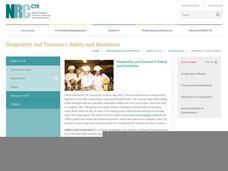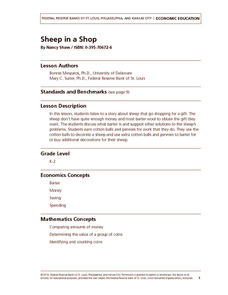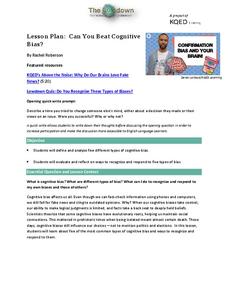National Research Center for Career and Technical Education
Hospitality and Tourism 1: Safety and Sanitation
Math and science come alive in this career-related lesson on sanitation. Along the way, learners explore bacterial growth rates using exponential notation and graphs. A link to a very brief, but vivid video shows just how quickly these...
National Research Center for Career and Technical Education
Transportation, Distribution, and Logistics: Tire and Wheel Assemblies
Is bigger really better? By the end of this activity, learners will be able to apply formulas for computing the diameter of tires and wheel assemblies. Begin by showing a slide presentation that will review definitions for radius and...
Federal Reserve Bank
Sheep in a Shop
What do you think sheep might be able to barter when they don't have quite enough to buy a gift? Your pupils can find out this and much more during this lesson about Sheep in a Shop, spending, saving, and bartering.
Federal Reserve Bank
Glo Goes Shopping
Making decisions can be very difficult. Show your class one way to evaluate choices with this instructional activity, which is inspired by the book Glo Goes Shopping. Learners practicing using a decision-making grid with the content of...
Federal Reserve Bank
“W” Is for Wages, W-4 and W-2
Don't let your young adults get lost in the alphabet soup of their paychecks and federal income taxes. Using sample pay stubs and reproductions of government forms, your class members will identify the purpose of such forms as a W-4 and...
Institute of Electrical and Electronics Engineers
Sugar Crystal Challenge
Blow your learners' minds with a sweet lesson on nanotechnology that uses sugar to demonstrate the difference nanoscale surface area makes in dissolving and crystal formation. Plenty of supportive background information is read to...
Melissa Institute for Violence Prevention and Treatment
Concept Muraling
Concept muraling helps learners improve their comprehension of a text by giving them a way to organize their understanding of the key concepts in that text. Introduce readers to this process with a carefully scaffolded lesson that models...
Virginia Polytechnic Institute and State University
Lesson Plan: Omelet Cooking Principles
Although designed for a foods lab, the information in this resource might be just the thing for your own recipe notebook. Illustrated, step-by-step directions for making the perfect omelet, egg-citing puzzles, games, and even...
NPR
Lesson Plan: Trolls—Just Like You and Me?
Not all trolls hide under bridges; some of them hide behind computer screens! Learners explore the causes and effects of people leaving mean comments online. After learning vocabulary, watching and discussing a video, and responding to...
Boston Symphony Orchestra
The Elements of Music—How do Composers Plan?
The introduction to Tchaikovsky's Swan Lake and the finale of his Symphony No. 4 provide young musicians with an opportunity to investigate the music elements composers employ to develop the themes they want to create. They compare the...
Smithsonian Institution
The Sounds of an Island: Jamaican Music for the Classroom
Introduce young explorers to the music and history of Jamaican culture through game songs and dances. As a bonus, class members get to play simple songs transcribed for the recorder.
Curated OER
Responding Syllables: Reading and Music
Shell Silverstein’s “Sick” provides an opportunity for kids to demonstrate their understanding of syllables and phonemes. The class creates a list of descriptive words used in the poem that have more than one syllable, and brainstorm how...
University of California
The Civil War: Effects of the Civil War
Imagine being on the front line of the Civil War —from the front porch of your own house. Scholars use visual evidence from primary and secondary sources to analyze the impact of the Civil War on all Americans. They examine the research...
NPR
Can You Beat Cognitive Bias?
In a time of fake news, media manipulation, and Internet trolls, a resource equips learners with the tools they need to recognize and combat resources that are designed to appeal to our cognitive biases. Introduce learners to five...
Smithsonian Institution
Singing for Justice: Following the Musical Journey of “This Little Light of Mine”
Scholars go on a musical journey to discover the origin, importance, and evolution of the song, "This Little Light of Mine". Class members boost their voice talents and clap to the beat while learning the lyrics in both English and Zulu....
Federal Reserve Bank
Credit Reports—and You Thought Your Report Card Was Important
Get the facts about credit and take a close look at what factors into a consumer credit report with this fantastic lesson. Your pupils will read informational texts, read sample financial documents, and discuss the advantages and...
Sargent Art
Protect Our Marine Life
Encourage water conservation and boost art skills with a hands-on activity that challenges young painters to create a scene highlighting marine life. Using oil pastels, scholars draw an underwater scene and write a tip for viewers to...
EngageNY
Presenting a Research-Based Claim: Effective Speaking Techniques
Take note. Scholars receive their claim drafts back to revise and write their claims and three pieces of evidence on notecards. They save the notecards to use when the verbally present their claims to the class. At the end, individuals...
Shutterfly
Shutterfly Photo Story Lesson Plan
A reading of Peggy Parish's Amelia Bedelia launches a study of idioms. Groups then select several idioms, write the meaning of the expressions, draw or select images, and use GIMP or Photoshop to create an idiom book.
Star Wars in the Classroom
"Shakespeare and Star Wars": Lesson Plan Days 8 and 9
How does an author's choice of artistic medium influence an audience? What about how an author chooses to transform original source material? These are the questions class members grapple with as they compare scenes from episode IV...
Channel Islands Film
Cache: Lesson Plan 1 - Grades 9-12
Archaeologists have discovered a cache of Native American relics. They want to preserve these relics by removing them from the rapidly eroding site to a lab where they can be studied. Native American traditions demand that the items be...
Channel Islands Film
Cache: Lesson Plan 2 - Grades 4-6
Class members will dig this activity that has them trying their hand at recovering artifacts. Groups are assigned a section of a sandbox, carefully uncover the artifacts in their section, and then develop theories about who might have...
Prestwick House
"Because I could not stop for Death" -- Visualizing Meaning and Tone
Emily Dickinson's "Because I could not stop for Death" provides high schoolers with an opportunity to practice their critical thinking skills. They examine the images, diction, rhythm, and rhyme scheme the poet uses and consider how...
Classics for Kids
"Mars" from The Planets
Gustav Holst's The Planets provide young musicians an opportunity to examine how composers can create a suite: a collection of smaller pieces grouped to explore a single topic. After listening to "Jupiter," they examine "Mars" in detail,...

























